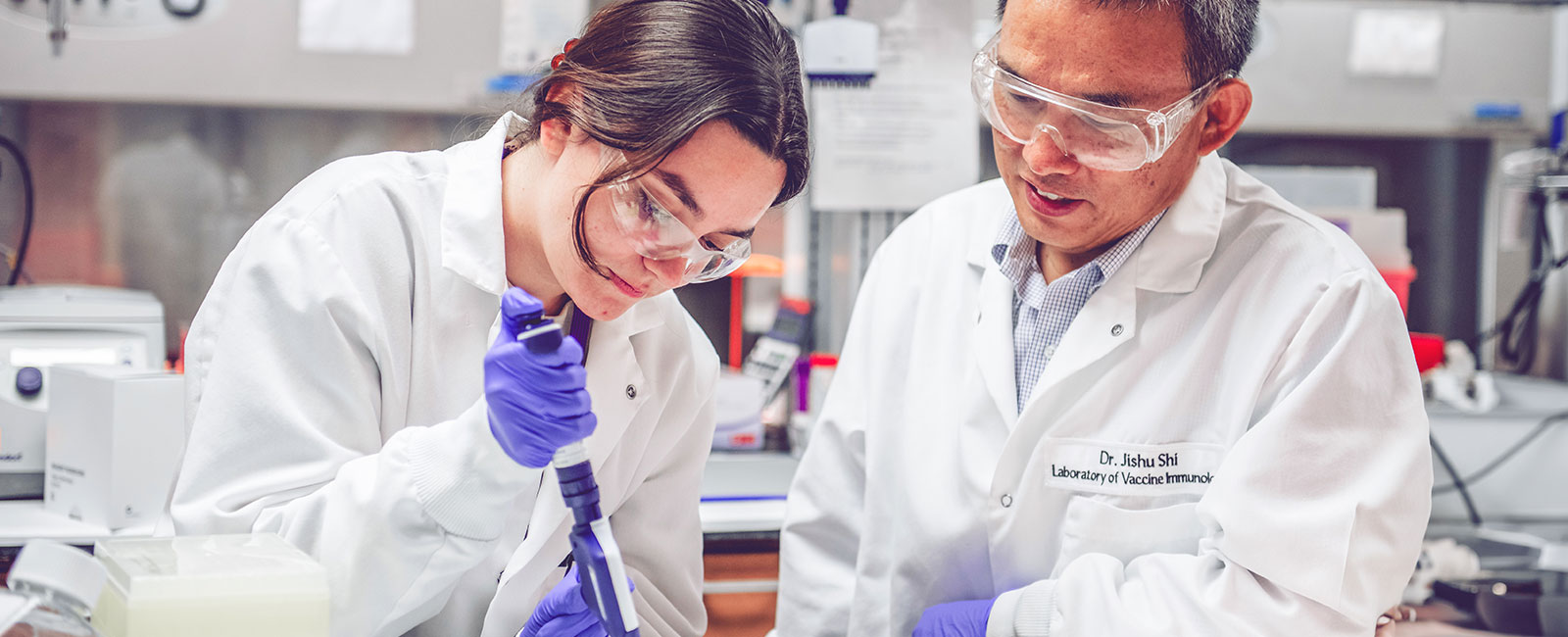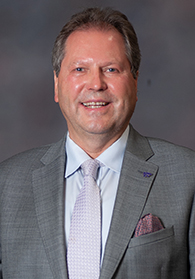
Enhancing Global Food Security and Biosecurity
Developing safe and sustainable agricultural practices and studying animal and plant infectious diseases to improve global health and security.
A University at the Forefront of the Bioeconomy
At Kansas State University, our researchers work to solve complex, global challenges in food security and biosecurity that have critical implications for our state, nation and world. By understanding the impact of social, political and environmental factors on food production, we are contributing toward increased food production to feed a growing population. Additionally, our state-of-the-art facilities coupled with strong government and corporate connections put us at the forefront of understanding and mitigating animal and plant infectious diseases. Simply put, K-State helps feed the world and keep humanity safer, leveraging a One Health philosophy to serve our expanding and diverse society.
Great Plains Diagnostic Network
American agriculture must remain vigilant at every stage of food production to protect from threats throughout the system. Fortunately for American consumers, researchers at K-State work through the Great Plains Diagnostic Network with others around the country to address these threats.
 Jürgen Richt is a regents distinguished professor, a university distinguished professor in diagnostic medicine and pathobiology, and a Kansas Bioscience Authority eminent scholar in the College of Veterinary Medicine. Richt's work on high-consequence pathogens with zoonotic and transboundary potential has led to strategies to identify, control and eradicate such agents. His basic and applied research includes studies on animal influenza viruses — swine, bat and avian — and animal prion diseases, including bovine spongiform encephalopathy, Rift Valley Fever virus, African Swine fever virus, mpox virus, SARS-CoV-2 and Borna Disease virus. In October 2024, Richt was elected to the prestigious National Academy of Medicine, one of the highest honors in the fields of health and medicine that recognizes individuals who have demonstrated outstanding professional achievement and commitment to service.
Jürgen Richt is a regents distinguished professor, a university distinguished professor in diagnostic medicine and pathobiology, and a Kansas Bioscience Authority eminent scholar in the College of Veterinary Medicine. Richt's work on high-consequence pathogens with zoonotic and transboundary potential has led to strategies to identify, control and eradicate such agents. His basic and applied research includes studies on animal influenza viruses — swine, bat and avian — and animal prion diseases, including bovine spongiform encephalopathy, Rift Valley Fever virus, African Swine fever virus, mpox virus, SARS-CoV-2 and Borna Disease virus. In October 2024, Richt was elected to the prestigious National Academy of Medicine, one of the highest honors in the fields of health and medicine that recognizes individuals who have demonstrated outstanding professional achievement and commitment to service. Jamie Retallick is the director of the Veterinary Diagnostic Laboratory at Kansas State University. Retallick serves as a diagnostic pathologist, which involves biopsy and necropsy services from referring veterinarians and the K-State Veterinary Health Center. Her research contributions often have her providing pathology support for collaborative studies, including projects focused on canine influenza virus, canine urethral bulking agents, swine Influenza virus, pH1N1 in swine, and porcine reproductive and respiratory syndrome virus.
Jamie Retallick is the director of the Veterinary Diagnostic Laboratory at Kansas State University. Retallick serves as a diagnostic pathologist, which involves biopsy and necropsy services from referring veterinarians and the K-State Veterinary Health Center. Her research contributions often have her providing pathology support for collaborative studies, including projects focused on canine influenza virus, canine urethral bulking agents, swine Influenza virus, pH1N1 in swine, and porcine reproductive and respiratory syndrome virus.Kansas State Veterinary Diagnostic Lab
The mission of the Kansas State Veterinary Diagnostic Laboratory (KSVDL) is to develop and deliver accurate, innovative, and timely diagnostic and consultative services to the veterinary and animal health community in Kansas and the nation. Our laboratories provide high-quality diagnostic services to practicing veterinarians, the Veterinary Health Center, researchers and industry.
Biosecurity Research Institute
The Biosecurity Research Institute at Pat Roberts Hall on the Kansas State University Manhattan campus is a unique biocontainment research and education facility that has helped K-State become a national leader in biodefense research. BSL-3, ABSL-3 and BSL3-Ag spaces offer a diverse range of research and educational opportunities.